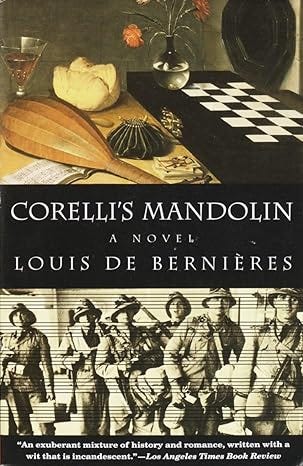Corelli’s Mandolin Revisited
I’ve been on this romance novel kick. I recently finished a book with my wife, Stephanie, about a cookbook writer who travels to Lastovo Island in Croatia to re-discover her roots, find lost family, and fall in love…again. So, during this romance kick, I’ve been reading, you guessed it, romances. The latest was Louis de Bernières’ Corelli’s Mandolin, which I hadn’t read since it came out in 1994.
The book is essentially a romance. Captain Corelli comes to the Greek island of Cephalonia as part of the Italian Army’s occupation during WWII. He meets the daughter of a local doctor, Palegia, and they fall in love. The basic romance storyline or trope is there. Palegia is already engaged to be married to another man and initially hates Corelli because he’s part of the occupation by Italy and Germany. He’s charming and not the sinister military rapist most expect. They slowly fall in love.
Complications ensue. Palegia’s betrothed comes back a broken and evil man. Italy fell to the Allied forces and Italians are now enemies of Germany. Corelli narrowly misses the extermination of the six thousand or more Italians on the islands. He is spirited off to Italy, but before leaving, Corelli promises to return, leaving his mandolin as assurance. He doesn’t come back for years, and all assume he died in the war. But, of course, he does return when both he and Palegia are old. She’s never gotten over her love of him, and ditto, Corelli. Tears all around as they live happily ever after.
Interestingly, though the story follows the predictable romantic trope, nothing else in the book is cliché. There’s the subplot of Carlo, who is gay and enlists in the Italian army to be close to other men. The Italian chain of command is riddled with incompetence and cronyism. He fights through Albania and then into Greece with his best friend Francisco, who Carlo secretly loves, only to see him die in the trenches. On the island of Cephalonia, he secretly falls in love with Corelli and saves him toward the end, sacrificing his own life for the one he loves. Another subplot follows Palegia’s first love, Mandras, a beautiful boy who swims with the dolphins, has a simple life as a fisherman, and makes Palegia laugh. He enlists in the Greek army, then with the communist partisans. The war changes him from the simple fisherman into a sadist and rapist. Nature wins over nurture. It’s a long book with many more interlacing subplots.
Then, the craft of the book. It’s usually hubris to try to tell a story using a mix of points of view. Switching from first person to third person becomes a distraction from the actual story. Or throw in a long personal letter and then watch your reader’s eyes glaze over. Get too clever with your prose, and you risk drowsiness. Not so much with Bernières. He jumps from first person to third person, from close third person to multiple character point of view, to omniscient narrator. He throws in personal letters. Then, other times, he writes straight-up history. It surprisingly all works. One story thread I particularly enjoyed was the satirical scenes with the character of Mussolini, Il Duce, told in first person.
How does it all work? What’s the glue? Romance, Love. The trope is the glue. It doesn’t work if Palegia doesn’t first become enamored with Mandras. This first love shows her passion and ability to fall in love. Then, with Corelli, the possibility of love becomes so remote: he’s the occupier, and falling in love would mean treason. And he doesn’t speak Greek. There’s so much to overcome for the two to come together, but it’s so much sweeter when they do. Then, there’s no way to save Corelli from the Nazi firing squad if the secret love of Carlos isn’t there in a subplot. And to make that love believable, the reader must live with Carlo as he secretly loves Francisco. The ending is all trope. Corelli and Palegia had met their one true love, but then it appears to end with both left loveless for the rest of their lives. The trope demands a happy ending, and we’re given it when Corelli returns to Cephalonia. Ok, I cried.
Talk about hubris—some producers in Hollywood had the very thin idea that Corelli’s Mandolin would make a decent movie. An incredible cast was rounded up: Nicolas Cage, Penelope Cruz, John Hurt, Christian Bale, and Irene Papas. Horrible reviews and 28% on Rotten Tomatoes. I’d heard it sucked, so never watched it. I never will.


